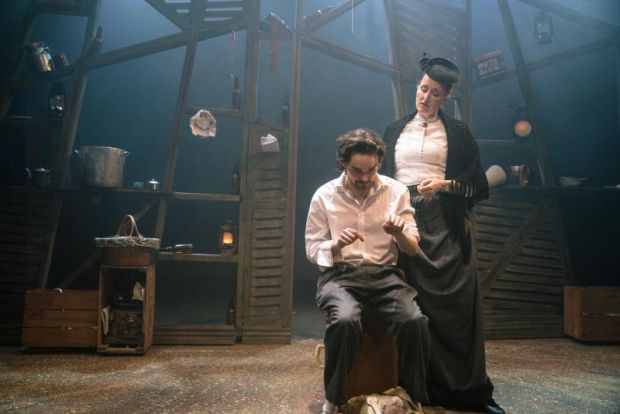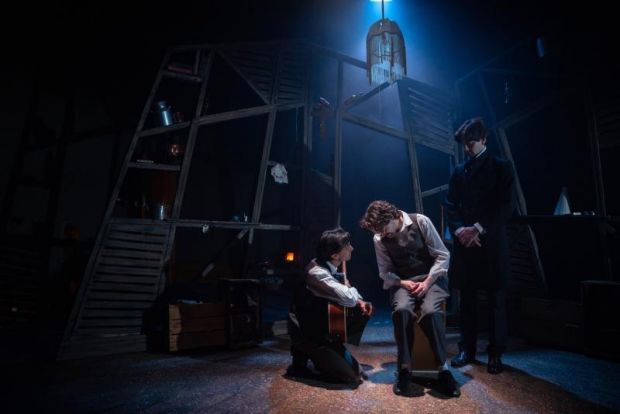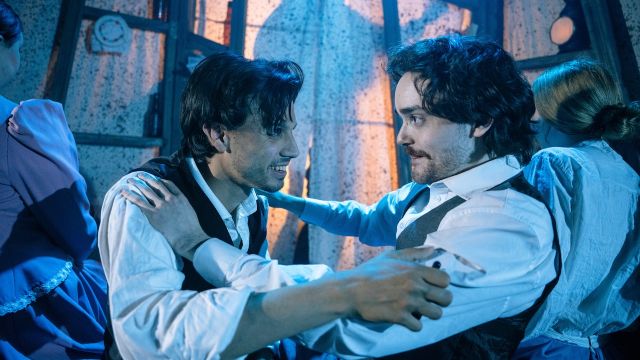Measure of a Moment
‘Marvellous Melbourne’ in the 1890s was not, of course, marvellous for everyone. Not for wage slaves in times of boom and bust. Not for Connor (Jordan Chodziesner) a sensitive young man with aspirations to be a poet, but miserably working as a bank clerk with an officious supervisor (Luke Toniolo) looking over his shoulder. His father (Darren Mort) is a bully, and his mother (Clarissa McPherson) is anxious and restricting. But when Connor meets Nic (Asher Griffith-Jones), a shop assistant, and they click, things look up…
At the heart of Measure of a Moment is Connor and Nic’s friendship.
But Connor’s search for happiness and quick fix fulfilment takes him away from Nic and into gambling and drugs – sometimes accompanied by a curious character, the Bagman (Liliana Dalton, recently so brilliant as the eponymous Caligula), a sort of Muse, spirit companion and temptress… Connor goes ‘on the wallaby’ where he meets a stockman (Luke Toniolo) - but the bush is not for him: he’s made for the city – or says he is - and lasts only a day.

Playwright Mercovich is tough on his anti-hero, but things are not helped by what he calls in his program note his ‘timeless dialogue’ – that is, an often heightened ‘poetic mode’ – delivered hastily and often mumbled by this cast. Darren Mort’s Barty and Marcus Clarke are the clear exceptions: a touch hammy but we know what’s what. With numerous short scenes following rapidly one after the other, and that ‘timeless dialogue’ I confess to not knowing sometimes quite where we were or just what was happening – or why it mattered.
But in any case, it is difficult to care very much about Connor, partly due to Jordan Chodziesner’s portrayal of him as a weak, recessive, whingeing fellow, who rarely meets his interlocuter’s eye. There is no greater turn-off in drama than self-pity, but this is, unfortunately, Connor’s persona – whether by choice or at Robert Johnson’s direction.

Connor’s excuse, his get-out-of-jail card that he is a ‘poet’ is obviated by the fact that he never seems to write much poetry that we hear about. Is he a poet or just a wanna-be? If the latter, that’s a perfectly viable character, but if that’s the intention one would have thought there needs to be another dimension to him.
The second act slows down a little and is more comprehensible - simpler and clearer. Connor finds Nic again – but Nic is married – unhappily - with a child on the way – and his wife (Abigail Pettigrew) is immediately suspicious of Connor. Another misstep, a dalliance with a sweet country lass (Claire Duncan) demonstrates Connor’s habitual evasions and confusion – and shows him up as rather a selfish cad.

Riley Tapp’s set design is imaginative and evocative, but too specific, too dominating, given that it must stand in for a bank, a shop, a suburban cottage, a farmhouse, a gaol cell, and a newspaper office – and thus it necessitates frequent bringing on and taking off of various props (suitcases feature prominently). What Charles Mercovich has written could possibly work better as a film script (albeit with a cast with better diction and less allusive dialogue). With a tighter focus on the bromance/love story that is at its heart we could well have had something like E M Forster’s Maurice - a moving story in which denial, cowardice and the mores of the time prevent love and happiness. It’s clear from the final scene that such is the intention, but that’s not what we see on stage.
Michael Brindley
Subscribe to our E-Newsletter, buy our latest print edition or find a Performing Arts book at Book Nook.

